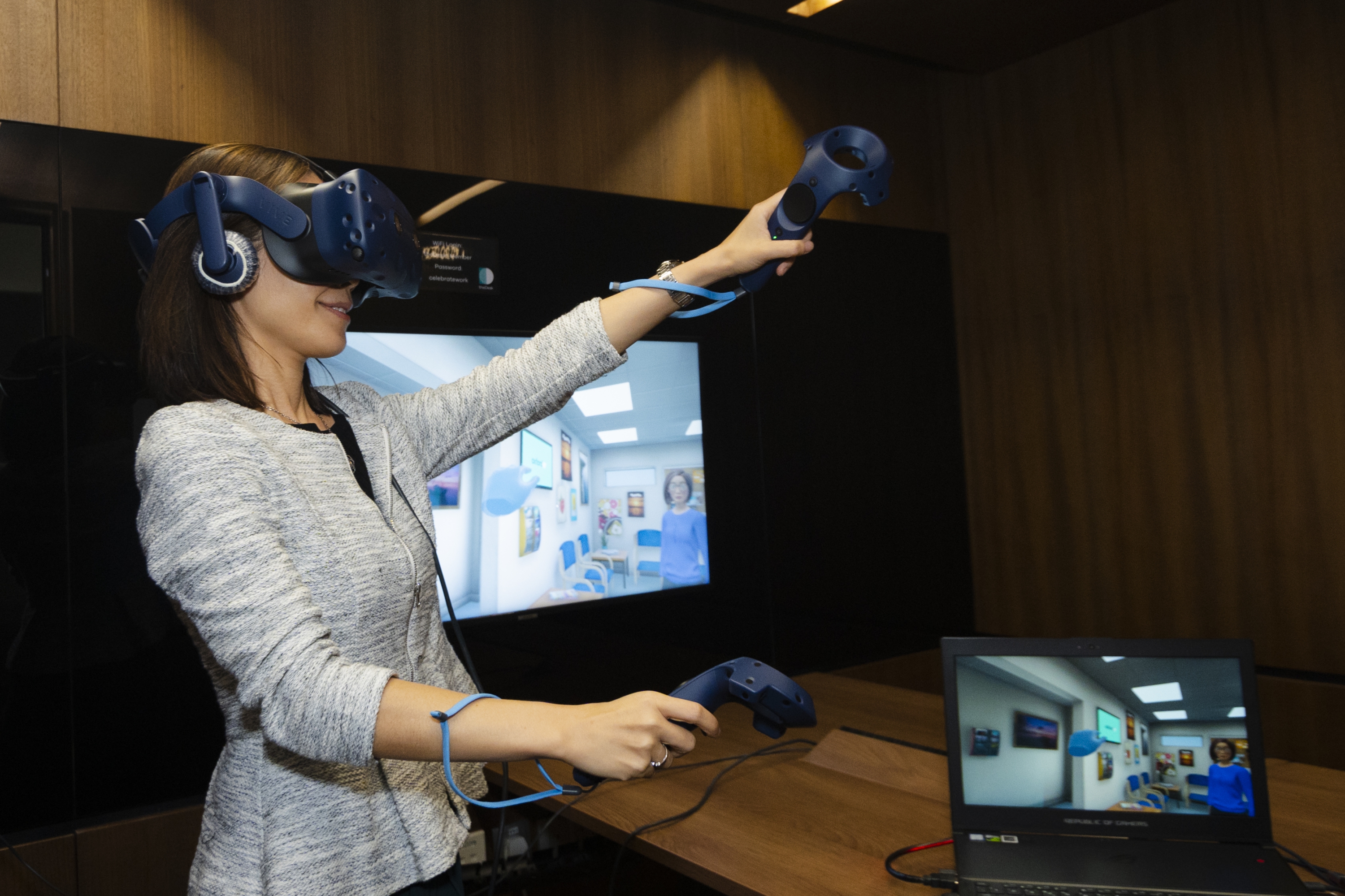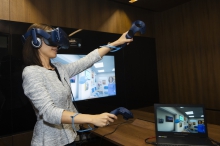CUHK
News Centre
CUHK, AXA Hong Kong and Oxford VR Begin Second Stage of Pioneering Immersive VR Trial to Tackle Social Avoidance Amid COVID-19 Calling on New Volunteers to Join
The Chinese University of Hong Kong (CUHK), AXA Hong Kong and Oxford VR (OVR) are commencing the second phase of the “Yes I Can” initiative, a ground-breaking immersive mental health therapy programme in Asia. Following a successful pilot earlier in 2020, the programme is opening the trial to a wider population where it will continue to examine how virtual reality (VR) can treat severe anxious social avoidance. With COVID-19 related social distancing measures affecting the mental health of the Hong Kong population, this free trial aims to address developments in this space.
In Hong Kong, 1 in 7 adults have common mental disorders, namely anxiety, depression, or a combination of the two. Yet, only a quarter of the individuals ever seek help due to stigma, access, and costs. The use of immersive technology, however, may be an innovative, accessible and destigmatising solution for patients seeking high quality therapy at a lower cost.
CUHK in collaboration with AXA Hong Kong and Oxford VR, a first-of-its-kind partnership, launched “Yes I Can” in 2019 to offer a ground-breaking new mental health solution for social avoidance. Based on a cognitive therapy approach, the intervention introduced by the programme involves a virtual coach acting as a therapist and will be delivered through consumer VR Devices. Participants will be guided by the virtual coach through a series of graded tasks in different VR environments that reflect everyday situations they may usually avoid. By completing these exercises, the trial hopes to demonstrate that people start to gain more confidence to cope with these situations in real life, as the cognitive change learnt during the immersive therapy is transferred to their day-to-day lives.
Early findings from the pilot have been very promising, with those who participated seeing their overall symptoms of depression (PHQ-9) and anxiety (GAD-7) improved. Individuals who have participated in the programme have also reported they felt less anxious when making social interactions and felt less impaired by their social avoidance symptoms. One participant reported that the therapy helped reduce nervousness in real life situations: “I realised that maybe daily life is similar to that in VR training. This somehow reduces my nervousness. I now can plan to buy clothes by myself which I had never done before.”
The study is based on Oxford VR’s ground-breaking anxious social avoidance product, currently under trial in the United Kingdom’s National Health Service funded project, gameChange, in partnership with the University of Oxford, and designed to treat patients with psychosis. For the “Yes I Can” initiative, the product has been tailored for the Cantonese speaking population in Hong Kong to treat people that suffer from anxious social avoidance.
The delivery of these large scale studies is proof of the increasing role emerging technologies play in revolutionising mental health therapy. The positive results from these early findings point to Oxford VR’s potential to scale and treat a series of mental health conditions through immersive technology.
Professor Winnie Mak, Professor, Department of Psychology, CUHK said: “Using virtual reality (VR) to tackle social avoidance is a new endeavour. We are very excited to see the positive results that the VR intervention has on our users’ lives in just 3 sessions during the pilot phase. With the launch of the second phase of our trial, we hope to gather more solid evidence that this new means of treatment delivery can potentially improve people’s psychological condition and daily functioning. We are very happy that this partnership with AXA Hong Kong and Oxford VR enables us to deliver state-of-the art interventions to the Hong Kong people.”
Mr. Arvind Tewari, Chief Operating Officer of Oxford VR said: “We are incredibly pleased that the initial stages of the trial have shown the potential for the programme to benefit the people of Hong Kong. We have seen the impact that anxious social avoidance can have on people’s daily lives and wellbeing, and this has clearly been exacerbated by the pandemic. To be a step closer to finding a solution for this is exciting and we hope the second phase of the trial demonstrates the same positive findings. We are proud to be working with AXA Hong Kong and CUHK to potentially deliver life changing outcomes for the trial participants.”
The research team is calling on new participants who are struggling in everyday social situations to take place in the trial. The trial is facilitated by CUHK and with funding from AXA Research Fund. For more information on how to register and eligibility, please refer to the website: https://www.axa.com.hk/en/oxford-vr
“Yes I Can” promo video: https://www.facebook.com/dwlab.hk/posts/2908573649412409



